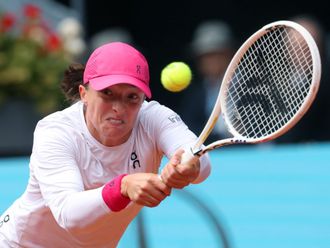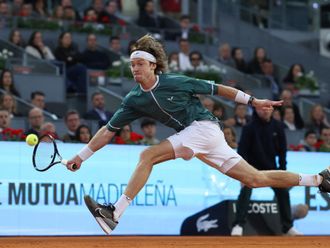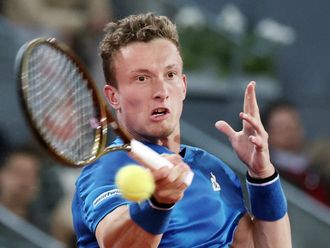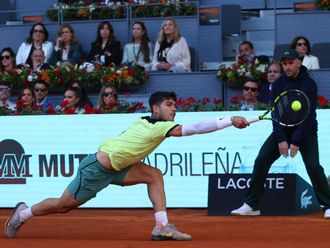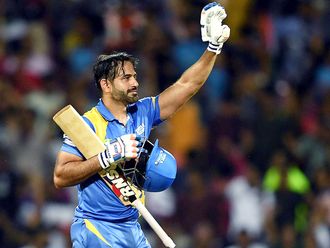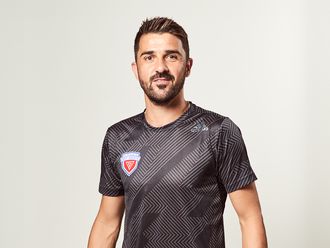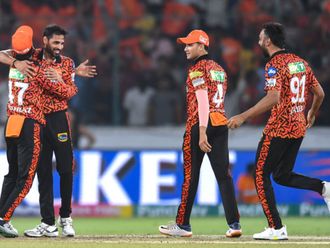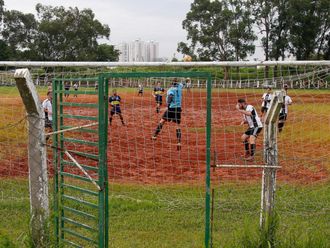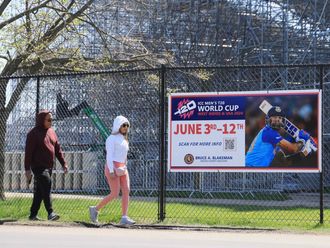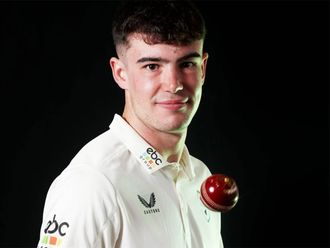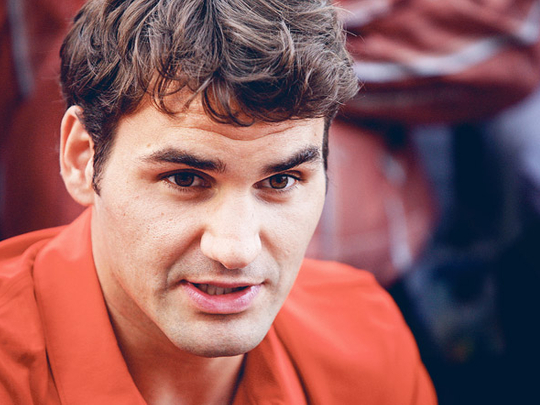
Simplicity and humility breezed into the room wearing a bright smile; a red Nike tennis shirt; a pair of faded jeans and worn out Converse sneakers.
The only clothing item that looked to be of some value was a dark blue jacket with the letters ‘RF' emblazoned in red on the chest.
At this point an introduction was necessary.
"Hi, I'm Roger Federer…"
"Oh, hi Roger. I am so and so…this is so and so…they are so and so…and we are so and so…and we are here to…"
Federer kept nodding and smiling and shaking hands.
For someone who has spent life at the summit of his sport for years Federer wears the cloak of celebrity lightly. Funnily enough he is used to breathing the air at the rarefied heights, which he traverses with ease when compared to ordinary tennis playing mortals on the ATP Tour.
In pictures: Roger Federer's love affair with the UAE
But here on earth, in the thick red carpet soaked snooker room tucked away in the innermost reaches of the Burj Al Arab hotel, the most complete and successful player in contemporary tennis wasn't doing too well — courtesy of a lung infection.
Unlike his game, which is based on fluidity, economy of movement and effort coupled with a skill and efficiency that would put some of the most advanced software programmes to shame, Federer talks fast and without pausing. And then he suddenly stops, his eyes scanning the person opposite him, as if waiting for a return, or a serve designed to evade his outstretched racquet.
"Are we ready? 1-2-3" he said into the microphone.
I press down on the record button of my dictaphone.
Gulf News: How do you feel?
Roger Federer: Better than a few days ago. I was sick and in bed and had to go to the hospital. I feel better, but I'm afraid I have picked up a lung infection and have to stay away for sports for at least two weeks. That's what the doctors are saying. Unfortunately this means that I cannot play the tournament here. This is disappointing. I was practicing hard till Tuesday and I was ready to go and feeling good, but the next day I just couldn't get out of bed anymore. It's a pity, but I hope that I can recover from it.
From the tournament's point of view it is sad because they have lost you early for two years in a row.
Exactly. It's been unlucky for me the past few years. Before that I was in five straight Dubai finals and I won four of them!. But I guess sometimes you just go through a few tournaments where you are actually unlucky. Actually, I went through this similar phase in my home tournament in Basel where I used to be a ball boy. I was injured there for two years thigh and ankle twist and then had a bad back. Then I won the event for three years after that! So I guess one goes through these phases when everything seems to hit you at the same time. But I have to learn why this happens to me mostly in February (laughs). Maybe there is no good reason except that I am rundown.
Okay, let us examine this argument: there is the constant grind of the Tour, coupled with the fact that you aren't getting any younger. Ironically, even at the age of 28-29 you are being seen as the elder statesman of the game right now. Do you view this tag with any scepticism?
I am not 29 yet, thank God! I am 28. But if you look at the Top 10, there's me and Roddick and Gonzalez…we are the oldest guys around I think. Then there are the others who come in at the ages of 21-22-23. I am at least six years older than some of them. In tennis terms they are the next generation. And you get this new wave of players every 5-6 years on the Tour. I am happy to be part of it that is, being one of the oldest guys of the group, but not yet over the hill. So I am trying to help the game, make it grow and leave it better off than when I came.
But would you agree that the chase for the top spot is getting tighter? Even for you. You are faced with managing your own expectations on the court against other new priorities. And all the while the youngsters are snapping at your heels. This can be pretty disconcerting.
The tough part of having young guys around is that they all want to be No 1. Everybody wants to win a grand slam and make the breakthrough. It's tough when you are young and you haven't achieved all that you want to. The expectations from people around you are high and then there are your own expectations. Then you look at what the other guys have achieved, especially players like myself, and you want to be like us, or even better, or be special.
To me personally this means having a lot of positive results. This is hard because I have to work hard. The new challengers are tough to play but I have been at the top for almost 270 weeks and counting. I think I have faced many challenges and overcome different players from the earlier generations, including the likes of Andre Agassi and Pete Sampras. Suffice to say that the last seven years have been interesting.
Your game has been analysed closely and experts have broken each facet up and studied it before finally concluding that your tennis is flawless. But if you were to analyse yourself and look at it simplistically what would you say are the strengths that have seen you stay for so long at the top?
I think it is my will to win, to have success. But more importantly, my love for the game is really big. I think there is also the respect that I have for my craft. I know that it isn't going to last forever so I constantly question myself and reinvent myself. Even in the best of times I question myself. This means that when times are hard it becomes easier to study your game simply because it's not something that you have done for the first time.
On closer analysis, however, I think my movement on the court and my fluid groundstrokes are my strengths. These two facets have helped me stay injury-free most of the time. I also work extremely hard during the off season both on and off the court, trying to win my matches. I have been tired at times and have had niggling injuries but it's just a way of trying to manage everything at the same time: the sponsors, the media, the tournament, the pressure, the expectations and the travelling. These are all difficult to balance especially now with my family and two children. But it's a nice welcome for me. I am the happiest person alive right now but you know it can get more interesting because it isn't going to be any easier over the next few years with the youngsters pushing through.
To be at the top and still winning: What do you really do to take your game to the next level. Can there be any major overhaul in your repertoire right now?
The thing with tennis is that it's quite difficult to completely change everything unless you think of taking six months to a year off, work on your game and then come back. You can then be a different player. But the problem in our sport is that it isn't really possible. You come through as a teenager and the way you come through is the way you are going to finish your career with the pluses and the minuses. But you need to make sure that your strengths get even better and the weaknesses don't get worse, or you improve those as well. Then again tactically and mentally you need to survive the pressure as well through the years and through the matches…that is the interesting part of our game.
You helped design a new racquet for yourself recently. What did you want from it?
I just think that it's nice working with Wilson. They have made some of the greatest racquets in the game and they have new technology being devised and coming in all the time. I thought that maybe to be stuck with one single racquet for an entire career isn't enough, so it's important to be presented with the newest technology that they have and make cosmetic changes as well. If they think cosmetic changes are the thing to do then I am happy to talk to them as well.
It's like this: When I speak to Nike about the clothing then I like to be involved because at the end of the day I have to be comfortable with what I wear on the court and they want me to have success. I also want it to be exciting for the fans so we try and come up with good ideas.
Do you think the answer to your high-level of skill and consistency lies in the simplicity of its execution?
I am very relaxed on the court and it shows in the way I play my points. I don't get overtly excited about a lost point, or a point that I win because I believe in the long run I am still going to be playing thousands of points in the future and thousands of hours of matches on the court. If I get too excited about everything I do then I won't last. My goal is to be able to play for a long time and stick around and enjoy the Tour. I don't want to be pushed out because I am fed up with tennis. That was not my idea when I picked up a racquet for the first time. I took up tennis because I loved the game.
Reprioritising your life on the tour: Having a family means a new set of responsibilities. Everything changes. Do you think it will change your will on the courts, the way you approach victory and defeat. There are more important things to look forward to?
Definitely, there are more important things than just a little tennis ball. I am very proud of the Foundation work that I do. Then as a professional tennis player with a family you get an even better idea of what to expect. Winning or losing has not been a problem at all over the last few years. I used to be too anxious to win when I was younger. If I lost then I would cry and be disappointed. This would stay with me for hours…it was crazy. Today when I lose I know that I gave it all I had. Then it's easier to walk away feeling okay about yourself.
But you have been known to show your emotions and cry at certain tournaments. A few Grand Slams come to mind…
Yes…
Is it because you were too obsessed with wanting to win there?
You mean win a Slam?
Yes…like you once cried after losing the Australian Open and once after winning Wimbledon.
You see, tennis is not like other sports where they have to focus for 10 seconds, or maybe an hour and then they win the Olympic gold and the dream is still alive. For us it's a three-week grind in the majors. You have a week's preparation and then you go and try to win round after round. It's a waiting game and then you are answering questions about yourself and everyday you begin to feel a bit different. The whole process takes a while and all of a sudden it happens and you feel so relieved and so proud and happy because you feel like it has been a long road to get to the top of the podium and win a trophy. That's why players break down in tears..
You have been a role model for so many people and kids. They idolise you. What does it take for you to be this way?
Maybe good manners. That's what my parents taught me. But then at the end of the day I admired my own role models for how they played tennis. So it depends on how you look at it. If I am a role model on the human side then it's extremely flattering, especially on the courts with my behaviour and the way I play. I am trying to inspire younger players. But it depends on which angle you look at it from and who you are trying to address. I am happy I have such a wide fan base all over the world - from young kids to older people
But how about when it comes down to being a role model for the products that you endorse? You are expected to be a specific type of individual because there are market segments and age groups, even to the commodities that you endorse. Are you conscious of that fact?
Not really, I believe that I have to be comfortable to my brands that I endorse. It needs to be a win-win situation. It's not just because I did it and it makes me money and it gives me fame. That is not the goal in my life.
And do you ever take the public's perception of you as a role for granted…ever?
No. It goes away very quickly. I am fortunate because it seems like my image is good at the moment. People like me all over the world. The stadiums are full when I play and kids want my autograph and scream my name. It's a nice position to be in. This makes it all the more fun, travelling the world and going to see different places. This cannot be boring at all.
You are aware that sometimes the affections of the fans can cross the line. Their obsession can spill into an athlete's personal life. There is a limit to everything, but it can be argued that because the public pay for the tickets and the consumer buys the brand that an athlete endorses they have the right to know everything about them. What is your perception of this?
Well I think we live in different times today than like 20 years ago. Today the internet and the media are so strong, that when things are written and blogs are typed they move very quickly. I'm not scared because I am not hiding anything (laughs) but if someone takes a picture of me having lunch somewhere this could be all over the world in no time at all because the interest is so huge.
Fortunately, I live in places like Dubai and Switzerland where the attention is moderate. I can live my life normally. I am happy that this is still possible for me.
Grand slam wins
Australian Open: 2004, 2006, 2007, 2010
French Open: 2009
Wimbledon: 2003, 2004, 2005, 2006, 2007, 2009
US Open: 2004, 2005, 2006, 2007, 2008
Most grand slam wins
16: Roger Federer
14: Pete Sampras
12: Roy Emerson
11: Rod Laver, Bjorn Borg
10: Bill Tilden
8: Fred Perry, Ken Rosewall; Jimmy Connors; Ivan Lendl; Andre Agassi
7: Richard Sears; William Renshaw; Rene Lacoste; Henri Cochet; William Larned; John Newcombe; John McEnroe; Mats Wilander
6: Laurie Doherty; Tony Wilding; Jack Crawford; Don Budge; Stefan Edberg; Boris Becker; Rafael Nadal
5: Frank Sedgman; Tony Trabert
- 237 Weeks at the top (Feb 2, 2004 to Aug 11, 2008)
- 32 (July 6, 2009 till date)
- $55.35m Career Earnings (Year to date: $1.99m)


